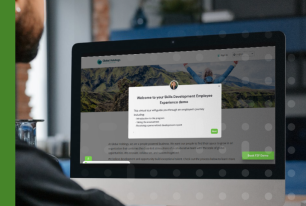One Small Step for SHL, One Giant Leap for Neurodiversity Research
In the last 12 months, SHL has continued to lead the charge to progress neurodiversity research in the field of talent assessment. Learn more about what we are doing to improve the test-taking experience for the neurodiverse talent pool.
Share
A new chapter in our journey
Over the past year, SHL has continued enhancing our understanding of neurodiversity and talent assessments, and how we can create a more inclusive assessment experience for all. This phase of our exciting journey began last spring when we welcomed three passionate new members to our neurodiversity research team. With these new members on the team, SHL has been able to continue to push forward the conversations being had around the globe relating to neurodiversity. As one of those fresh faces, I am excited to share with you some of the incredible progress we have made in the past year.
My own neurodiversity odyssey (my personal connection)
First, let me tell you a bit about my journey and why this is such an important topic to me. When I first heard about the work SHL was doing to enhance the assessment experience of the neurodivergent community, I knew it was something that I had to be a part of. As someone with dyslexia and dysgraphia, I have always been acutely aware of the unique challenges that certain assessments can pose for individuals with cognitive processing differences. Throughout my life, I have often felt frustrated watching my peers complete reading and writing tests they make seem simple, while I struggled to keep pace. This imbalance was always so clear to me that the prospect of inclusive assessments that would allow me to keep up seemed as distant as the moon once did to humanity. When I heard SHL was working to solve this problem as well as help others in similar situations to mine, I knew I had to contribute!
Understanding the universe (bridging the knowledge gap)
In any great adventure, the first step to a team’s success is understanding the landscape of the problem that needs to be overcome. For SHL, this meant broadening our understanding of how neurodivergent individuals perform on and experience real-world talent assessments, an area where there has not been much empirical research in the past. To better understand what needs to be done to help create an inclusive process, SHL analyzed the performance and reactions of over half a million candidates on a wide range of cognitive ability, behavioral, and personality assessments.
These efforts have produced findings that were released in our recent white paper, while others are currently under review for publication in a peer-reviewed journal. One of the interesting insights from our research so far is that the requirement to disclose continues to be a burden for candidates. This needs to be relieved or removed entirely by creating assessments that are universally inclusive and accessible, allowing a wider range of candidates the opportunity to perform at their best without the need to disclose and request accommodations—this is something that we, at SHL, strive to do.
Getting off the ground (translating science to practice)
After laying the foundation with extensive research and raising awareness, we are thrilled to dive into the next crucial phase of our neurodiversity journey at SHL, where we will be putting our findings into practice. We are using the findings from our research to enhance our technology to provide a more inclusive experience for candidates.
For example, here are some of the product enhancements we have made to our Smart Interview on Demand tool:
- Enabling clients to administer non-video versions of our interview, either as a blanket approach or on request, to promote inclusion by reducing anxiety and removing the demands of masking.
- Allowing clients to set what image the candidate sees to help them feel more comfortable while recording their video interview.
- Giving clients the ability to allow candidates to re-record their answers up to a maximum of five times.
In addition, we are undertaking a review of all candidate instructions to increase comfort levels and understanding and are also exploring what features we can make customizable to reduce the burden of disclosure and enhance the testing experience for all neurodiverse candidates.
“The requirement to disclose continues to be a burden that needs to be relieved or removed entirely by creating assessments that are universally inclusive and accessible, allowing a wider range of candidates the opportunity to perform at their best without the need to disclose and request accommodations.”
Broadcasting our findings to the stars (sharing our findings and raising awareness)
In this next part of our journey, we are focused on communicating our insights and discoveries to the wider community to help inform best practices for assessing a neurodiverse talent pool. As we continue to better our understanding of the path to neuro-inclusive assessments, we recognize that sharing our findings, as well as partnering with both practitioners and researchers, is essential for driving change and raising awareness.
We are sharing these insights through multiple channels:
- Internal webinars and toolkits that enable our teams to communicate the impact neuro-inclusive processes can have to our clients.
- Thought leadership pieces like our previous blogs, 2022 white paper, and research publications, which spread our findings to a wider academic and practitioner community.
- Events like the upcoming Society for Industrial and Organizational Psychology (SIOP) conference where we will be contributing to multiple presentations and Neurodiversity Celebration Week in March of 2023 where we presented to over 2,000 attendees about the benefits of inclusive assessment processes.
We have started to work directly with our clients and product team to bridge the gap between science and practice.
Join in the adventure
This progress represents great strides, not only for SHL but for the wider neurodiversity research community. However, it is important to note that this is just the beginning and that SHL is committed to continuing to work to create an inclusive assessment experience. We are excited to be on this journey, as it holds significant implications not only for SHL and our valued clients but for the entire neurodivergent community! We would love you to join us on this journey as we continue to explore reactions and performance across a broader range of assessments, either as a client or academic research partner!
Please visit our Neurodiversity Collection page to access our resources and contact us to learn more.









